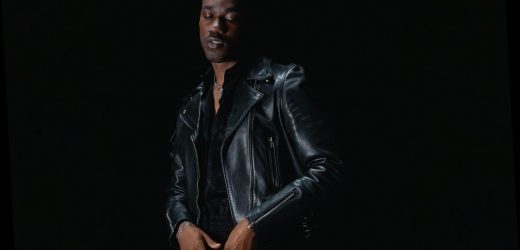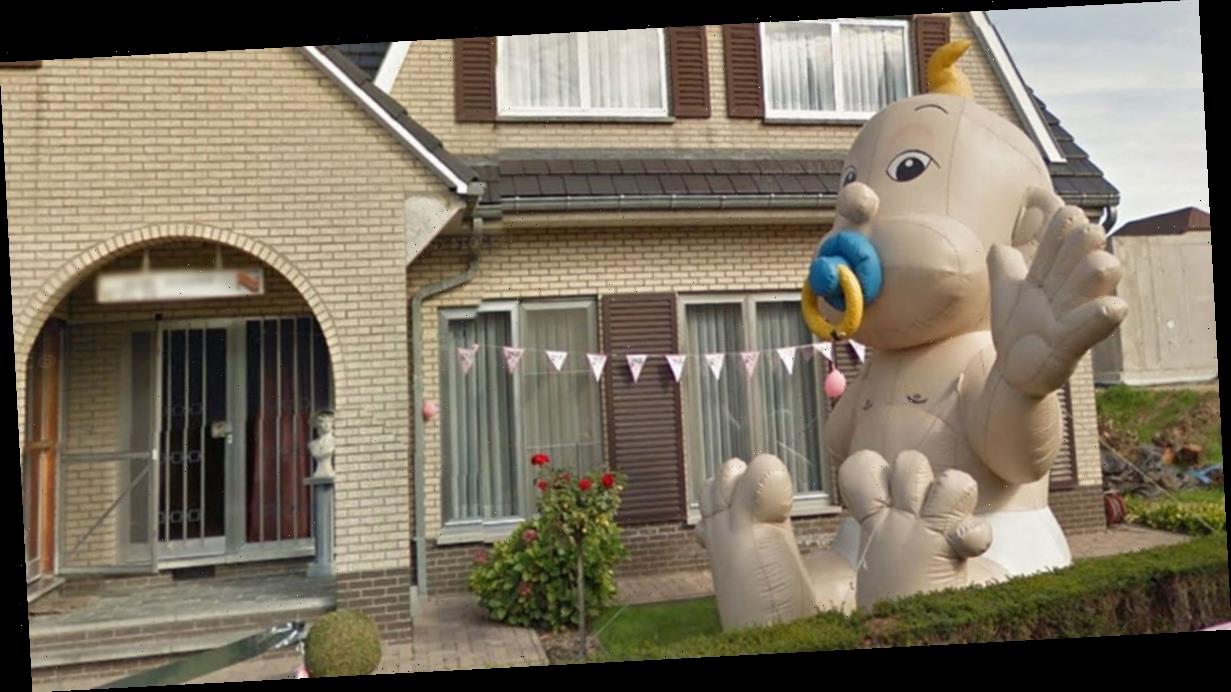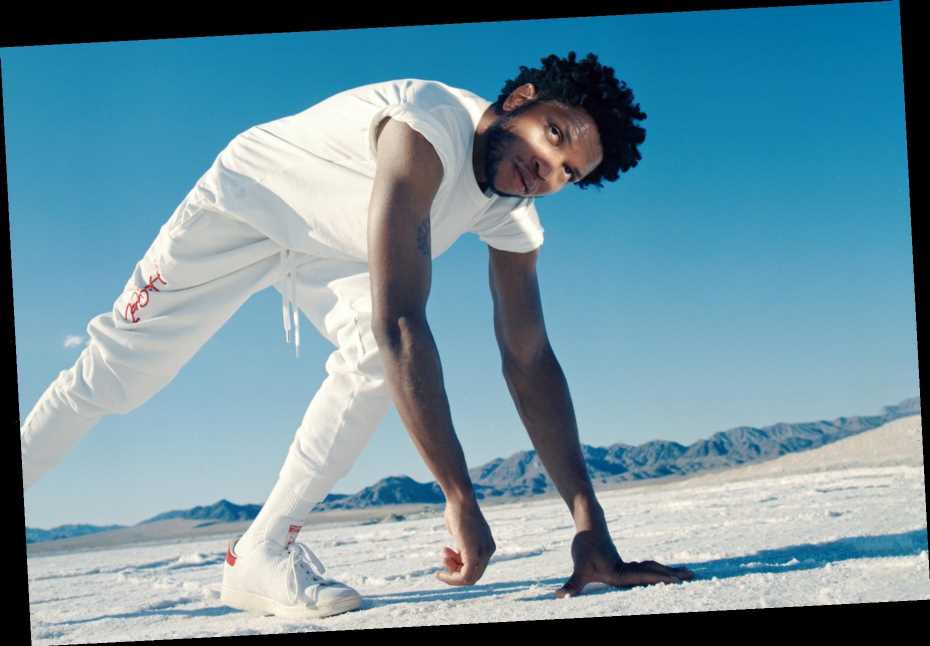Over the phone, the 26-year-old singer Giveon is eager to talk about his transition into superstardom. In the past three years, he’s been on songs with hitmakers Justin Bieber and Drake and was even nominated for a Grammy. Before all of this, he was working in restaurants. “For everyone else, it kind of felt like it was overnight,” says Giveon. “But for me, I put years in.”
After being featured on Drake’s “Chicago Freestyle” last February, Giveon has been carving out a loyal fanbase that deems him as next up. His latest project, When It’s All Said And Done…Take Time is a compilation of his first two projects. Take Time was nominated for best R&B album at the Grammys. On both records, Giveon uses his deep tone and cinematic songwriting to create soulful, ageless tunes. Born as Giveon Dezmann Evans, The Long Beach native explains that although his hometown is known for G-funk and gangsta rap, R&B and soul music were the real soundtracks to his home growing up.
Giveon draws inspiration from a range of different artists for different reasons. Frank Sinatra and Barry White’s tone, Frank Ocean’s mystic and visual approach to songwriting, Miguel’s non-auto-tuned raw voice, and also Drake. “There are some artists that I feel like artists are inspired by that it’s so subconscious,” Giveon says. “Like, I listen to him [Drake] all the time and I’ll pick up stuff that I’m don’t even realize I’m picking up until I listen back.”
Before Giveon became a full-time artist, he worked as a server at restaurants. He’d make music during his time off. He would make music that he didn’t plan on anyone hearing just to continue to fine-tune his sound. Working on music without any resources, feedback or progress began to frustrate Giveon until he reached his turning point that he was going to make music for himself as if no one would ever hear it. “As soon as I came to terms with that is when people started actually hearing it and paying attention to it,” says Giveon.
Your new project is a compilation of your last two projects. Can you talk about how you came up with the idea to package both?
So I mean they were always trying to attach and connect like conceptual. So this was just a way for you to be able to press play on it and just let the story run through perfectly without having to, you know, create a playlist or switch over or anything like that. And also, like, there’s a lot of growth, there’s a lot of new fans every month. So I kind of wanted to put all my music in a place where the new fans could be able to digest it as well. I want to bring a whole new audience in, so I would hate to just ignore it, like a Grammy nominated project (‘Take Time’). I don’t want them to forget that process because I could make the assumption that once you discover a new artist that you go back and deep dive into the discography but a lot of people don’t do that.
What’s your process when it comes to writing songs?
So sometimes I’ll have words or concepts written down before I have any type of music or anything. So when I have that, sometimes I just hear a beat and if I feel like it’ll match with the story that I have written down sonically, then I’ll just pair them together. So for “All To Me,” like I had the story already ready to go, but once I heard that beat it kind of had a spooky, haunted kind of vibe to it. That one mesh together really well. So right now I have a list of stories I want to tell and I’m just waiting for the right world to be created around them.
Not too many artists choose their actual name as their stage name, why did you decide to do that?
I used to wish I had a simpler name that people could just read and won’t be like, what kind of name is this, you know? One day I had a conversation with my mom and I asked what made you choose that as my name? So I asked her and she said, honestly, I just see you being a given person one day. And I was like, aight I can’t really argue with that. So now I’m so happy that she didn’t just give me a regular name. One of my brothers name is John and I tell him now like yea your name regular. So when it comes to like should I go buy it or not, I was like yo I’m lucky enough to have a name that no one else has. I might as well take advantage of it. If I have the same name as my brother, it would be hard to just put John on a shirt, you know? So I was very lucky with that. So it goes back to my voice too and accepting who I am, so it all just ties back in.
What are some of your earliest memories of music and when did you first discover that love for music?
Like any black kid on a Sunday your mom’s cleaning the house to music. So that was like my very first memory. My mom having it in the background with incense lit. But my love for music grew because that music was just attached with feel good. Like just expressing yourself and chilling on a Sunday vibe. So I fell in love with it. Not yet as a creator, just in love with music. Then I fell in love with the art of storytelling because I used to write actual stories, 40 pages. But then I kind of wanted the instant gratification. Does someone like this or not, let me know by tomorrow. But nobody wanted to read the full story by me that quickly. So I condensed it to where they could give me feedback that I wanted within the next three minutes. And that’s how I got to turning stories into a song. I would say through this whole process of writing songs, telling the story, figuring out the sonics, the singing came last. Because after middle school, my voice pitched down super low. So it was very uncomfortable. I didn’t know how to use it. I didn’t know what it was because there was no one singing at these tones. And then I was lucky enough to come across baritone players like Frank Sinatra and Barry White and stuff like that. So, yeah, it was a unorthodox process, but it worked out perfectly.
I heard that you were a big Frank Sinatra fan and Barry White. How did that happen?
So I did a program with the Recording Academy, the Grammy Museum. So pretty much they take like one hundred kids during the summer and like for a week or two every day they go over something different in music history. Then during the music history part of the program they would just tell us about the different eras. So when we got to the 60s with the swing jazz era, crooners like Nat King Cole, The Rap Pack and all that. That’s when I discovered there were these really swaggy, charismatic, non gimmicky baritone singers. I was inspired by that. And I wanted to modernize that essentially and make it more youthful and make it more me.
You have such a unique and deep tone in your voice, and you talked about how your voice changed, but today’s music is full of autotune and voices are pitching higher. How do you continue to stick to your roots and your sound?
I think people could get obsessed with the idea of perfection. So with that, you kind of stray away from your raw imperfections. Like I don’t think people realize that people are okay with you missing a note here or hearing the rasp in your voice. I think I was fortunate enough to be like, yes people love my tone, the way I could hold a note and my runs. But I think that they appreciate the rawness of it, my delivery and the emotion behind it better than staying in key the whole time. I think they believe me when I’m singing and if you doctor it up too much, you could take away the soul of it. So I just decided to stick with it and run with it. A lot of people try to not sing at their natural tone because they feel like they don’t like it but I accepted my voice.
You released your first official single “Garden Kisses” in 2018, you toured with Snow Aalegra in 2019, then obviously the Drake feature on “Chicago Freestyle” in 2020 which led to you being signed. How would you describe that time of your life?
Yeah it was crazy cause it’s like you work on something for so long and you think you’re ready. Then once you finally get to a point where you’re ready, look at all that work and was like, yo, I was nowhere near ready. So it made me appreciate the concept of artist development, which I feel like is going extinct. Give the artists time to build and grow into themselves. I was lucky enough to be able to develop as an artist when no one was listening. So if all that stuff happened and I started developing now, I literally don’t know where I would be, I probably would have blown the moment. The body of work that followed up “Chicago Freestyle” would have not helped. But I kind of feel bad for some kids that get thrown into this so early because first impressions are everything. If the world met me at 18 I would sound completely different. Songs would be different. For everyone else it kind of felt like it was overnight but for me, I was like yeah, I put years in and unprovoked development too. I didn’t see any accolades and I didn’t have any connections or resources. I was just developing myself and just sticking to it. Then the momentum started coming at the right time.
How did “Chicago Freestyle” with Drake come together?
So on tour my set was really short. I didn’t have any music out really besides “Garden Kisses” and “Fields,” so for each city I would like a freestyle and my manager Simon heard the Chicago one. He was like oh this is fire. So he sent it to Drake and then it just it just came together like that. And the crazy thing is, I did it in Chicago and nobody knew what it would become. Not even me.
With so many accomplishments this early in your career, what are some goals you have in music and outside of music?
I could see myself writing a script and also I’m big on fashion. But those things, I’ve learned that just like I knew I wasn’t ready yet or for music and even now I am currently developing my craft or just storytelling or writing to take it to film and just developing as an artist and a sense of fashion too. So once I feel like those two are not in a good place, I want to take it to the next level As far as music, I’m working on my debut album. I try to work every day and I want to go on tour. I think by the time the world opens up, I’m going to have three projects that I didn’t get to tour so I’m itching to go on tour and meet all these new faces. My debut EP dropped the day after the lockdown was announced. So all of this happened during a pandemic for me. I was never able to see faces, none of it. So it’s probably going to be culture shock from the last time I was out on tour with Snoh verses now. It’s going to be extremely different. So that’s definitely my goal, to finish my debut album, headlining a tour and just develop myself as an artist for film and fashion.
How did the collaboration come together on Justin Bieber’s “Peaches”?
So I think I gave him my number one time because he was a a big fan of ‘Take Time’ and told me he was listening to it all the time. And then one day I was in a session and kind of had a block. So I was about to end the session but then he FaceTime me and was like yo, I really want you on this, please get on it. And I was like, okay, sure. Then he sent it to me and I was oh this is a vibe, and I was kind of like yo Bieber coming crazy. So I gotta come crazy. So then I sent my verse back and he was like, oh, this is amazing and I was like thank you for having me be apart of this. Then he called me again two days later and I was like what’s going on? He was like how do you feel about adding Daniel? I was like, of course, like, why would I say no to that? Like, I love you Daniel. So then he added, Daniel And now it’s just like a bop, it’s a vibe and I’m happy I get to show people that I have to tempo to me as well. I want to make sure people know that I’m dynamic and versatile. I really want to show I can dive into any world and it still will connect with people and resonate.
Source: Read Full Article


